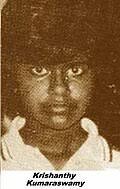
The legacy of Krishanthi Kumaraswamy,Remembering 29 years on
Krishanthi Kumaraswamy was a notable figure in the context of the Chemmani mass graves incident in Sri Lanka. She was a young girl who went missing during the civil conflict in the country, and her case has become emblematic of the broader issues of human rights violations and the impact of war on civilians.
7th of September marks 29 years since the Chemmani massacre of 1996, in which Sri Lankan soldiers raped and murdered Tamil schoolgirl, Krishanthi Kumaraswamy, and three of her family members that had gone looking
The Chemmani area, in the Jaffna Peninsula, became infamous for the discovery of mass graves, which were believed to contain the remains of those who disappeared during the conflict. Krishanthi’s story highlights the personal tragedies experienced by many families and has been a focal point for discussions on accountability, justice, and reconciliation in post-conflict Sri Lanka.
Krishanthi Kumaraswamy was just 16 years old when she disappeared in 1996, a victim of the Sri Lankan civil war that lasted from 1983 to 2009. Her case gained significant attention due to the circumstances surrounding her abduction and the subsequent discovery of mass graves in Chemmani.
After her disappearance, her family sought justice, leading to investigations and ultimately revealing the existence of mass graves in Chemmani. In 1999, the Sri Lankan government admitted that security forces were involved in the killings, and the discovery of bodies in the area sparked outrage and demands for accountability.
Krishanthi’s story is emblematic of the broader human rights abuses that occurred during the conflict, particularly against Tamil civilians. Her case became a symbol for many families searching for their missing loved ones and highlighted the need for thorough investigations into disappearances and killings during the war.
In the years following the conflict, various organisations and activists have worked to keep Krishanthi’s memory alive, advocating for justice and the importance of addressing past atrocities. Commemorative events often include discussions on the need for reconciliation and the protection of human rights in Sri Lanka, reflecting the ongoing struggle for truth and justice.
The legacy of Krishanthi Kumaraswamy serves as a reminder of the personal toll of war and the necessity of acknowledging and addressing historical grievances to foster healing and prevent future conflicts.
Her memory continues to resonate with those advocating for the rights of victims and the need for truth and acknowledgment of past atrocities. Commemorative events and discussions often take place to honour her and others who suffered similarly, emphasising the importance of remembering these histories to prevent future violations.






